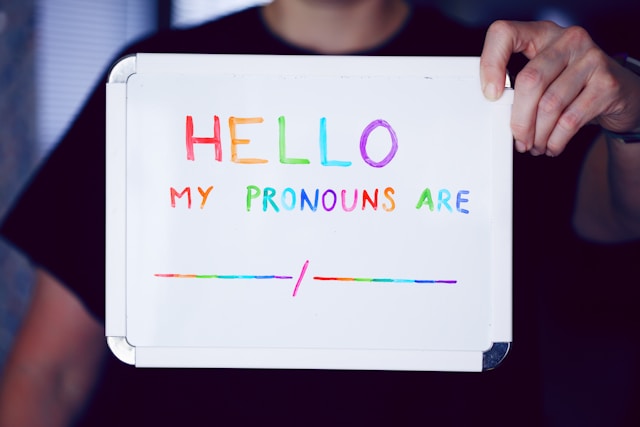Intent vs. Impact – A Pride Reflection
Rev. Chani Getter
June 30, 2024
“Why should I care about which pronouns people use, why should I care about what you prefer to be called, why can’t I just assume?”
Let me set the scene for you. I had been invited to speak about pronouns at a synagogue in Northern New Jersey during Pride month. We had just spent the morning in prayer together, and now I was answering questions from the congregants.
I was sitting with the rabbi in front of a community I had visited only once before (virtually during the pandemic). Many of the congregants were intrigued by how many references there are in the Talmud about gender-fluid people.
I took a deep breath, I wasn’t sure how I would answer. And I then I heard myself say:
“Because I die a little every time you mis-pronoun me.”
The room became quiet. You know the kind of quiet that happens after someone says something profound, the kind of silence that begs to be sat in as the people around recalibrate their thoughts, feelings, and emotions.
After the pause had filled the space the person responded, “But that is never my intention”.
“Of course not,” I said, “but intention does not equal impact, therefore, I forgive those who mistakenly say the wrong pronoun and then correct themselves. I let it slide often and correct seldomly.”
We as human beings are able to hold both the intent and the impact that our words and actions have on those around us. For us to heal this broken world we live in, we need to step into this messiness with gentleness and humility.
“I didn’t not mean to do x, y, z and yet I hurt your feelings, I am sorry.”
“You did not mean for this to come out as, racist, homophobic, xenophobic, anti-semitic, islamophobic, etc. and yet, here is the impact of your words, would you be willing to shift that?”
We may have the best of intentions, and our impact can and will hurt someone or an entire group of people. We are all learning and growing in this ever changing world.
Hearing from each other helps us grow.
“Because I die a little every time you mis-pronoun me,” I said.
Truthfully, I didn’t mean to say it out loud, my intention wasn’t to be that vulnerable.
I could have provided more education with statistics and graphs. However, I have learned that the best way to teach is through story, through personal experience. So, I shared my own.
After the event, someone came up to me and thanked me for sharing what I did. She said, “I didn’t realize how not taking my grandchild seriously was hurting them.”
That made me grateful that I spoke my truth and as vulnerable as it is, explained what happens inside of me when someone uses the wrong pronoun for me.
After the Pride event, I facilitated a group at Footsteps, where I serve as the scholar-in-residence. We talked about lack of choice. In the insular community we all came from, everything is dictated, there is very little room for self-expression or self-determination.
Maybe it is the intention of the rabbis in that community that we lose our individuality and follow the crowd. That the power of group-think keeps them in power. Perhaps that is not their intention. It almost doesn’t matter.
What mattered to the people who attended the group was the implication of living in a community that gave us very little choice about anything. From what we wear such as glasses and shoes and everything in between. Where we go to school, the person we will marry, and the absolute lack of autonomy when it comes to family planning.
This creates a life in which we continuously quiet our own thoughts, choices, and desires. Where it is hard, even as adults to hear our own voice and listen to our intuition, our inner knowing.
How can we step into the conversation of how our words impact each other?
How can we stay in conversation with those whose words or actions hurt us, knowing that they might have good intentions?
When do we need to step away from those who purposely or not so purposely hurt us and are not willing to be in conversation with us?
Happy Pride, today and all days.
Blessings,
Chani
PS: Like what I do? One way to support my work is to pre-order my first book Mapito! Another way is to make a financial contribution. This enables me to support people of all income levels. Thank you for reading!
audio version - listen now

Be the first to comment